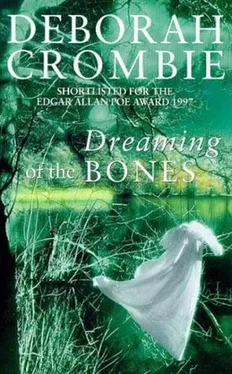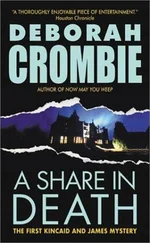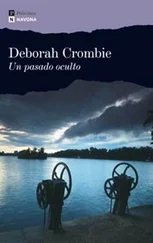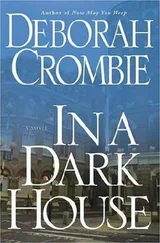Deborah Crombie - Dreaming of the bones
Здесь есть возможность читать онлайн «Deborah Crombie - Dreaming of the bones» весь текст электронной книги совершенно бесплатно (целиком полную версию без сокращений). В некоторых случаях можно слушать аудио, скачать через торрент в формате fb2 и присутствует краткое содержание. Жанр: Детектив, на английском языке. Описание произведения, (предисловие) а так же отзывы посетителей доступны на портале библиотеки ЛибКат.
- Название:Dreaming of the bones
- Автор:
- Жанр:
- Год:неизвестен
- ISBN:нет данных
- Рейтинг книги:3 / 5. Голосов: 1
-
Избранное:Добавить в избранное
- Отзывы:
-
Ваша оценка:
- 60
- 1
- 2
- 3
- 4
- 5
Dreaming of the bones: краткое содержание, описание и аннотация
Предлагаем к чтению аннотацию, описание, краткое содержание или предисловие (зависит от того, что написал сам автор книги «Dreaming of the bones»). Если вы не нашли необходимую информацию о книге — напишите в комментариях, мы постараемся отыскать её.
Edgar Awards (nominee)
Macavity Awards
Dr Victoria McClellan is writing a biography of the tortured poet Lydia Brooke, five years after Brooke's tragic suicide. Victoria becomes immersed in Lydia's life – she cannot believe the poet died by her own hand. So she calls her SI ex-husband for help in the case who receives terrible news…
Dreaming of the bones — читать онлайн бесплатно полную книгу (весь текст) целиком
Ниже представлен текст книги, разбитый по страницам. Система сохранения места последней прочитанной страницы, позволяет с удобством читать онлайн бесплатно книгу «Dreaming of the bones», без необходимости каждый раз заново искать на чём Вы остановились. Поставьте закладку, и сможете в любой момент перейти на страницу, на которой закончили чтение.
Интервал:
Закладка:
“If I were you, I’d give him a day or two, let him start sorting it out on his own. And I suspect that his anger is due to more than the circumstances of Vic’s death. Men often substitute anger for grief, because anger is the only emotion they’re taught it’s acceptable to feel. I don’t know what else you can do, love, because I doubt very much you’re going to change his mind about this.”
“The awful thing is that I understand how he feels, because I feel responsible, too,” said Gemma. “I thought Vic had legitimate cause to be uneasy about Lydia Brooke’s death, but I didn’t encourage Duncan to look into it any further.” She made a grimace of disgust, adding, “I didn’t want it to take his time away from me.”
“And you think that Vic’s death must be connected to her suspicions about Lydia’s death?” asked Hazel.
Shrugging, Gemma said, “It’s certainly possible. Unless someone knew enough about what Vic was doing to take advantage of it as camouflage.” She shivered. It was now almost fully dark, and the temperature in the garden had dropped. “But Lydia is as good a place to start as any. I wish I’d had a look at those things of Vic’s…”
“Didn’t you tell me that Lydia was fascinated with Rupert Brooke?”
“Yes, but I’m afraid I don’t know much about him, other than the golden young Edwardian poet stuff, and, ‘If I should die, think only this of me…’ We had to memorize it at school, and I remember thinking it was bloody stupid.” Gemma looked at the children, who had moved to the edge of the flagstones and were giggling while doing something unspeakable to one of Holly’s dolls. “I hope Toby will have more sense.”
“Men,” said Hazel, and they smiled at each other in tacit understanding. “Well, if you’re interested in Rupert Brooke, I’ve somethings you might like to see. Because you’re not going to let Duncan do this on his own, are you, love?”
Gemma hadn’t made a conscious decision, but as soon as Hazel spoke she knew it to be true, and inevitable. “No,” she said. “I suppose I’m not.”
After the children had been bathed, and Gemma had sat down to a vegetable lasagna with Tim and Hazel, Hazel left Tim with the dishes and led Gemma into the sitting room. Glass-fronted bookcases lined the walls either side of the fireplace, and Hazel studied them for a minute, her finger against her nose, before going to the right-hand case.
“I think I put them all together, but it’s been ages since I’ve looked at them, and the children will get into the books.” Hazel opened the case and bent down to survey the spines. “Ah, here they are.” Removing a few volumes, she carried them to the sofa, and Gemma sat down beside her. “I had rather a thing for Rupert myself at one time, so I can sympathize with Lydia’s infatuation. Rupert Chawner Brooke, born 1887, son of a Rugby master,” Hazel recited from memory, grinning.
She handed the first book to Gemma. “I’ve only a paperback of Marsh’s Memoir , I’m afraid, picked up at an Oxfam bookshop, but the contemporary introduction is worth reading, and it does contain all the poems.” Frowning, she added, “But these others Lydia wouldn’t have known when she was at college. The Hassall biography was published in 1964, the Letters in sixty-eight. And the collection of his love letters to Noel Olivier was only released a few years ago. Vic would have been familiar with all of these, though, I’m sure.”
“Who was Noel Olivier?” asked Gemma. “Any relation to Laurence?”
“The youngest of the four Olivier sisters, and I think they were cousins to Laurence,” explained Hazel. “Rupert met her when she was fifteen and he was twenty, and he was smitten with her for years. They remained friends and correspondents until he died.”
Accepting each volume as Hazel handed it across, Gemma wondered what she had got herself into. She studied the black-and-white photo of Brooke on the cover of the Memoir , with his tumbled hair and penetrating gaze. “He was quite stunningly beautiful, wasn’t he? I wondered why everyone was so besotted with him.”
“Yes, his looks were rather spectacular,” Hazel admitted. “But I doubt his looks alone would have generated such interest decades after his death. To me, he represents a slaughtered generation, a loss of innocence of a magnitude unimaginable before the Great War.”
“He was killed in the war, wasn’t he?”
“That’s the ironic thing,” said Hazel. “He never saw battle at all. He died in 1915, on the Greek island of Skyros, after contracting blood poisoning on a Divisional Field Day. But Churchill and the others in the Cabinet found his death, and his sonnets romanticizing the war, expedient-he made a lovely martyr to the cause. It was probably just as well for them that Brooke died when he did,” she added. “I’ve always thought that his views on the war would have changed dramatically if he’d lived to see action, and that change would have been reflected in his poems.”
“Was he a good poet, then?” asked Gemma.
“I think he showed flashes of brilliance, but who knows what he might have achieved? Virginia Woolf thought he was destined to become a politician.”
“He knew Virginia Woolf?”
“It seems he knew everyone, and that an astonishing number of those connected with him became notable in their own fields. Virginia Woolf, James and Lytton Strachey, Geoffrey and Maynard Keynes, the Darwin sisters. The list goes on and on.”
“So he fascinated those who knew him, not just those who came after.” Gemma touched the photograph as if she might bring it to life.
“From the accounts I’ve read, he had remarkable charisma, and I suppose, in a way, it survived him.”
“It all looks so innocent,” said Gemma, who had found the photograph section in Geoffrey Keynes’s Collected Letters .
Hazel laughed. “There is something enchantingly nostalgic about that prewar idyll, but I daresay not as innocent as we’d like to think. There was probably a good deal of naughtiness going on beneath those blazers and boaters and garden-party dresses. And Rupert, certainly, was more than a bit sexually… complicated.” She yawned and stretched. “Stay for a last cup of tea. We’ll light the fire and put some music on, and we can recite dear Rupert aloud.”
As much as she would have enjoyed spending an hour or two in the warmth of Hazel’s sitting room, Gemma felt a strong desire to be home alone with Toby, to reinforce her sense of their identity as a family. “Thanks, Hazel, but I’d better not. Toby will forget how to go to sleep in his own bed, and besides”-she patted the books in her lap-“I’ve got a lot of reading to do.”
Llangollen, Wales
30 September
1963 Dear Mummy ,
Please forgive me for giving you my news this way. It seems unfair at best, and cowardly at worst, especially when I know you wish only the best for me. But it all happened so suddenly, and we felt such a sense of urgency, that it seemed best to take the plunge and the conventions be damned .
Morgan and I were married, yesterday, in the Cambridge registry office .
I know what you’re thinking, darling Mummy, that we hardly know each other, that we’ve taken leave of our senses. But we’ve known each other more than a year, even though it’s only in the last few months that we’ve discovered that we see life with the same passion and intensity; and that we have the same goal, to record this life honestly, and to live it as well as we can .
And as for our senses, we’ve only just discovered them. Being with him makes me see things in ways I never imagined, and yet smell and taste and touch are magnified as if I were suddenly blind, and the beauty of the world round us is almost exquisitely painful. Oh, Mummy, his photographs will make your heart ache. He’s so brilliant, so talented, and I’m going to be his support and encouragement, as he will be mine .
Читать дальшеИнтервал:
Закладка:
Похожие книги на «Dreaming of the bones»
Представляем Вашему вниманию похожие книги на «Dreaming of the bones» списком для выбора. Мы отобрали схожую по названию и смыслу литературу в надежде предоставить читателям больше вариантов отыскать новые, интересные, ещё непрочитанные произведения.
Обсуждение, отзывы о книге «Dreaming of the bones» и просто собственные мнения читателей. Оставьте ваши комментарии, напишите, что Вы думаете о произведении, его смысле или главных героях. Укажите что конкретно понравилось, а что нет, и почему Вы так считаете.












